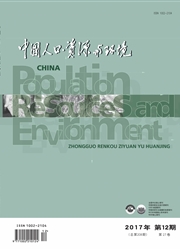

 中文摘要:
中文摘要:
当前,我国农村食品安全现状不容乐观,农村居民对于食品安全消费普遍持担忧态度。相对于多主体监管的城市而言,农村食品安全问题既突出又复杂,农村食品安全消费风险的区域差异性,以及农村居民对于食品安全消费担忧度的异质性,使得食品安全监管政策缺乏必要的地区针对性,有些政策甚至在部分农村食品安全消费监管中无所适从,从而难以达到预期效果。现有研究大都是以整体的宏观数据为研究对象,并未将空间微观因素考虑在内,弱化了区域间存在的客观差异,同时也忽略了地区间的相互传导。本文基于我国20个省份500个自然村的农村居民食品安全消费实证调研数据,在引入空间地理分析概念的基础上,采用空间相关性检验的全局Moran' I指数与局部Moran' I自相关指数,对农村居民食品安全消费态度进行深入分析,旨在为各省市农村食品安全态度差异性分析提供有力支撑。研究结果表明:我国农村居民整体食品安全消费态度呈现出一定的普遍性和差异性,并在空间上呈现出集聚现象,主要的热点省份为山东、河南、湖北、江西、安徽五省,说明在治理食品安全的问题上存在着地区紧迫性和针对性,应有重点的针对相关热点城市进行与当地社会、文化、经济状况相适宜的治理措施。接下来,基于实证结果分析造成各区域农村居民食品安全态度差异的影响因素。最后,针对各区域不同现实情况,文章有针对性的提出了对策建议。主要包括:政府必须正视自己的责任,实施切实有效的治理措施;必须抓住问题的主要矛盾与次要矛盾;必须切实落实“因地制宜”政策,针对不同地区的具体情况实施有针对性的治理措施等。
 英文摘要:
英文摘要:
At present,the problems of food safety in China' s countryside should not be ignored. Rural residents generally concern the safety of food consumption. With respect to the multi-agent supervision cities, rural food security issues are both prominent and complex. Due to regional differences in the risk in rural food consumption safety and the worry about the safety of food consumption, the regulatory measures of government lack the regional remedies which should be necessary, and some policies do not fit the rural food consumption safety supervision, so it is difficult to achieve the desired effect. Most of the existing research is based on the overall c data for the study, does not take into account the spatial micro factors, weakens the objective differences between regions, and ignores the mutual conduction between regions. In order to make in-depth analysis of rural consumers' attitudes to food safety, this paper does empirical analysis on data of rural consumers' attitudes to food safety of 500 natural villages in 20 provinces of China by introducing the concept of spatial geographic analysis and using the global Moran' I index and local Moran' I autocorrelation index. The research results show that the attitudes on food safety of rural consumer show universality and difference. Meanwhile, they also present the phenomenon of agglomeration in space. The main provinces showing the phenomenon are Shandong, Henan, Hubei, Jiangxi and Anhui. The results show that food security governance issues are showing the regional urgency and relevance, and government should be focused on the local social, cultural and economic conditions with appropriate control measures for the relevant destination city. Next, it analyzes various factors affecting rural area of food safety attitude differences based on the empirical results. Finally, the paper puts forward the countermeasures and suggestions for different regional realities. Government must face up to their responsibilities and implement effective control measures.
 同期刊论文项目
同期刊论文项目
 同项目期刊论文
同项目期刊论文
 期刊信息
期刊信息
